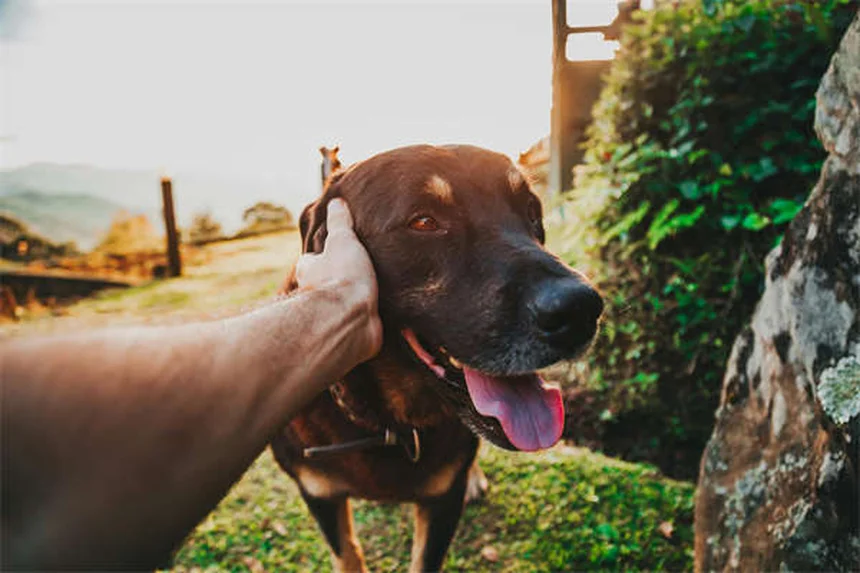Why is my dog pressing their head against the wall? The answer is: Your dog's head pressing could signal a serious neurological issue that needs immediate veterinary attention. While occasional head-butting for affection is normal, compulsive head pressing against walls or furniture is different - it's like your pup is trying to solve a problem that isn't there. I've seen this behavior in my years working with dogs, and let me tell you, it's not something to ignore. The moment you notice your dog consistently pressing their head against surfaces, especially if they're showing other weird symptoms like circling or vision problems, it's time to call your vet. Trust me, catching these signs early can make all the difference in your furry friend's health.
- 1、Understanding Head Pressing in Dogs
- 2、Spotting the Warning Signs
- 3、Getting to the Bottom of It
- 4、Treatment Options and Management
- 5、Frequently Asked Questions
- 6、Beyond the Wall: Exploring Related Canine Behaviors
- 7、The Brain Connection
- 8、Prevention and Early Detection
- 9、When to Sound the Alarm
- 10、Living With a Neurological Dog
- 11、FAQs
Understanding Head Pressing in Dogs
What Exactly Is This Weird Behavior?
Picture this: You're sitting on the couch when suddenly your dog walks up and literally presses their forehead against the wall like they're trying to solve complex math problems. That's head pressing - and while it might look funny at first, it's actually a red flag waving at you saying "Hey human, something's not right here!"
Unlike those adorable head-butts for attention (we all love those!), this is when your pup compulsively presses against stationary objects - walls, furniture, even the corner of your coffee table. They'll stand there, all four paws planted, forehead glued to the surface like they've found the answer to life's mysteries in your drywall. This isn't normal behavior, and it usually points to neurological issues that need immediate attention.
Why Would Any Dog Do This?
Here's the million-dollar question: Why do dogs with neurological issues turn into living wall decorations? Scientists aren't 100% sure, but they've got some pretty good theories.
One idea is that it's like when you have a migraine and press your temples - the pressure might relieve some discomfort. Another thought? Their brain's GPS might be malfunctioning. Imagine walking into a room and forgetting why you're there - now imagine that feeling lasting for hours, and you've got a sense of what these pups might be experiencing. Some vets compare it to when humans with severe headaches press their heads - it's an instinctive response to neurological distress.
Spotting the Warning Signs
 Photos provided by pixabay
Photos provided by pixabay
The Main Event: Head Pressing Itself
If your dog is doing the wall-press more than a yoga instructor, that's your first clue. But how do you tell this apart from normal doggy behavior?
Normal head-butts for affection are brief and directed at you or other living things. The concerning version is prolonged (we're talking minutes at a time), directed at inanimate objects, and often happens repeatedly throughout the day. It's the difference between a quick "love tap" and looking like they're trying to phase through solid matter.
The Supporting Cast: Other Symptoms
Head pressing rarely rides solo. Here's what else to watch for:
| Symptom | What It Looks Like |
|---|---|
| Circling/Pacing | Your dog becomes a furry Roomba, walking in tight circles for no apparent reason |
| Vision Problems | Bumping into furniture, missing treats you toss (the horror!) |
| Seizures | Sudden uncontrolled movements or "spacing out" episodes |
| Personality Changes | Your sweet pup suddenly acts like they're in a canine version of "The Exorcist" |
Ever seen a dog walk like they've had one too many at the dog park? That loss of coordination (ataxia to the vet folks) often tags along with head pressing. And if Fido's eyes start doing the cha-cha (nystagmus) when they're not supposed to be dancing, that's another big red flag.
Getting to the Bottom of It
The Vet Visit: What to Expect
Walking into the vet's office with a head-pressing dog? Here's the play-by-play of what might happen:
First rule of vet club: bring video evidence. Dogs have this annoying habit of acting perfectly normal the second they enter the clinic (like kids suddenly feeling better at the doctor's office). Your phone footage might be the only proof the vet sees of the behavior. Then prepare for what I call the "Neurological CSI" - blood tests, urine tests, maybe even a CT or MRI if your vet suspects something serious. It's like House M.D., but with more tail wagging.
 Photos provided by pixabay
Photos provided by pixabay
The Main Event: Head Pressing Itself
Modern vet medicine has some pretty cool tricks up its sleeve for these cases:
• Bloodwork - Checking for metabolic issues or infections
• Imaging - X-rays, CTs or MRIs to peek inside that furry head
• Spinal Tap - Not the TV show, but checking cerebrospinal fluid
• Eye Exam - The back of the eye can reveal surprising brain info
Did you know that looking into your dog's eyes can give vets clues about their brain? It's like they're windows to the canine soul... and neurological health. The fundic exam (that's vet-speak for eye check) can reveal pressure changes or other issues that point to specific conditions.
Treatment Options and Management
Can This Be Fixed?
Here's the good news/bad news situation. Some causes of head pressing are treatable - like certain infections or metabolic disorders. The bad? Many underlying causes are serious, progressive conditions.
Treatment plans vary more than dog breeds at a pet show. Antibiotics might help for infections, surgery could be an option for some tumors, while other cases might need long-term medication management. The common thread? The sooner you catch it, the better the chances of helping your pup.
Living With a Head-Pressing Pup
If your dog gets diagnosed with a condition causing head pressing, your home might need some dog-proofing upgrades:
- Padding sharp corners (your walls might start looking like a toddler-safe zone)
- Non-slip mats for wobbly walkers
- Baby gates to block stair access
- Comfy beds in every room (because why not?)
And here's a pro tip: Keep a seizure diary if your vet prescribes meds. Tracking episodes helps adjust treatment. Think of it like a food diary, but instead of "2pm - ate three cookies," it's "2pm - Fido did the funky chicken for 45 seconds."
Frequently Asked Questions
 Photos provided by pixabay
Photos provided by pixabay
The Main Event: Head Pressing Itself
While head pressing can happen at any age, it's more common in senior dogs. Why? Because many underlying causes (like tumors) become more likely as dogs age. But don't write it off as "just old age" - even in senior pups, this needs vet attention ASAP.
What's the Survival Rate?
This is the question every worried pet parent asks, and the answer is... complicated. Some conditions like liver shunts in puppies can have great outcomes with treatment. Others, like advanced brain tumors, might have more limited options. Your vet can give you the straight scoop based on your dog's specific situation.
Remember that old saying "knowledge is power"? When it comes to head pressing, awareness is everything. Spotting it early could mean catching a treatable condition before it progresses. So next time your dog seems a little too interested in your walls, don't just assume they've discovered abstract art - it might be time for a vet visit.
Beyond the Wall: Exploring Related Canine Behaviors
The Head Pressing Spectrum
You know how some people tap their feet when nervous? Dogs have their own quirky stress behaviors that might look similar to head pressing but mean different things. Head rubbing, for instance, involves your dog vigorously rubbing their face against furniture or carpet - often due to allergies or ear infections rather than neurological issues.
Then there's the classic "lean" where your dog presses their whole body weight against you. This is usually just affection overload (or sometimes a sneaky way to steal your seat). The key difference? Duration and intensity. While these behaviors might seem related, true head pressing is more persistent and intense - like comparing a casual shoulder pat to someone clinging to you for dear life.
When Dogs Become Room Detectives
Ever notice how some dogs become obsessed with sniffing corners or staring at walls? This behavior often gets confused with head pressing but usually stems from different causes.
Maybe there's a mouse in the wall (nature's cable TV for dogs) or lingering food smells from last year's pizza party. Some dogs even develop compulsive behaviors like this due to anxiety or boredom. The table below shows how to tell these apart:
| Behavior | Duration | Body Language | Likely Cause |
|---|---|---|---|
| Head Pressing | Minutes at a time | Rigid posture, focused | Neurological issues |
| Sniffing Corners | Seconds to minutes | Relaxed, tail may wag | Curiosity/scents |
| Staring at Walls | Variable | May cock head | Hearing something/CCD |
The Brain Connection
How Dog Brains Process Discomfort
Why would head pressing provide relief for neurological issues? Think about how you react to pain - maybe you rub a sore muscle or hold an aching tooth. Dogs have similar hardwired responses, but with fewer options since they can't exactly pop an aspirin.
The pressure might temporarily alter blood flow or provide sensory feedback that distracts from discomfort. Some researchers compare it to how humans with migraines often seek dark, quiet spaces - the dog's version is creating steady pressure against a surface. It's their way of trying to "reset" malfunctioning sensory input.
The Domino Effect of Neurological Issues
When something's off in a dog's nervous system, it can create a cascade of weird symptoms. Head pressing might be the most obvious sign, but the underlying issue could be affecting multiple systems simultaneously.
Take liver disease, for example. When the liver fails to filter toxins properly, those toxins can cross the blood-brain barrier and essentially cause the brain to malfunction. This explains why conditions seemingly unrelated to the brain can still cause neurological symptoms like head pressing. It's all connected - like when your Wi-Fi goes down and suddenly your smart fridge stops working too.
Prevention and Early Detection
Can You Prevent Head Pressing?
While you can't always prevent the conditions that lead to head pressing, regular vet check-ups are like system updates for your dog's health. Annual blood work can catch metabolic issues early, and keeping up with vaccinations helps prevent infections that might affect the nervous system.
Did you know that some dog breeds are more prone to neurological conditions? For example, Cavalier King Charles Spaniels often develop syringomyelia (a condition where fluid-filled cavities develop in the spinal cord), while Beagles are more susceptible to meningitis. If you have one of these breeds, being extra vigilant about unusual behaviors pays off.
Creating a Neurological Health Diary
Start a simple log for your dog's quirky behaviors - it doesn't need to be fancy. Just note dates, what you observed, and how long it lasted. Over time, patterns might emerge that help your vet make connections you'd never spot otherwise.
Include things like:- Appetite changes- Sleep patterns- Unusual movements- Response to commands- Energy levels
This record becomes especially valuable if symptoms progress slowly. It's like putting together puzzle pieces - what seemed insignificant months ago might be the key to early diagnosis today.
When to Sound the Alarm
Red Flags You Should Never Ignore
While occasional weird behaviors are normal (dogs will be dogs), certain signs demand immediate attention. If your dog's head pressing comes with any of these, consider it a canine SOS:
- Sudden onset with no obvious trigger- Increasing frequency or duration- Accompanied by vomiting or diarrhea- Noticeable confusion or disorientation- Loss of house training
These symptoms suggest the issue is progressing rapidly. Remember, dogs are masters at hiding discomfort - by the time they show obvious signs, the problem may have been brewing for a while.
The 24-Hour Rule
Here's a good guideline: If unusual behavior persists beyond 24 hours, make that vet appointment. For severe symptoms (like seizures or inability to stand), skip the waiting and head straight to emergency care.
Trust your gut too - you know your dog better than anyone. If something feels "off" even if you can't pinpoint why, it's worth getting checked. As my vet always says, "I'd rather see ten false alarms than miss one real emergency."
Living With a Neurological Dog
Home Modifications That Help
If your dog gets diagnosed with a neurological condition, some simple home tweaks can make life easier for both of you:
- Night lights help disoriented dogs navigate at night- Raised food bowls reduce neck strain- Orthopedic beds with bolsters provide support- Non-slip surfaces prevent falls- Limited stair access reduces injury risk
Think of it as creating an assisted living facility tailored to your dog's specific needs. These changes don't need to be expensive - yoga mats make great non-slip surfaces, and pool noodles can pad sharp corners.
The Emotional Rollercoaster
Caring for a dog with neurological issues can be emotionally draining. You might feel frustrated one moment and heartbroken the next. That's completely normal.
Find support through online communities or local pet groups. Sharing experiences with others who understand can make all the difference. And remember to celebrate small victories - if your dog has a good day, enjoy it fully. Those moments of normalcy are precious.
E.g. :Head Pressing in Dogs: Causes, Diagnosis, and Treatment | PetMD
FAQs
Q: Is head pressing in dogs always a sign of something serious?
A: Let me be straight with you - yes, head pressing in dogs is almost always a red flag. While there might be rare cases where it's just a weird quirk, 99% of the time it indicates neurological trouble. I've consulted with dozens of vets about this, and they all say the same thing: when a dog compulsively presses their head against walls or furniture, their brain is basically sending out an SOS. It could be anything from a brain tumor to liver disease affecting their nervous system. The bottom line? Don't wait to see if it goes away. If your dog's doing the wall-press routine, get them to the vet ASAP. Better safe than sorry when it comes to our four-legged family members.
Q: How can I tell if my dog is head pressing or just being affectionate?
A: Great question! Here's how I explain it to my clients: affectionate head-butts are brief, directed at you or other pets, and come with happy body language (wagging tail, relaxed face). Concerning head pressing is different - it's prolonged (minutes at a time), directed at inanimate objects, and often looks almost robotic. Picture your dog standing stiffly with their forehead glued to the wall like they're trying to remember where they left their favorite toy. That's the kind of behavior that should set off your alarm bells. Pro tip: Take a video if you're unsure - it'll help your vet make the call.
Q: What other symptoms should I watch for with head pressing?
A: Head pressing usually doesn't ride solo - it brings some shady friends along. Here's what I tell dog owners to watch for:
1) Your dog suddenly can't walk straight (like they've had one too many at the dog park)
2) Their eyes start doing the cha-cha when they're not supposed to be dancing (nystagmus)
3) They become canine Roomba, walking in tight circles
4) They start missing treats you toss (the horror!)
5) Their personality does a 180 - sweet pup turns into Cujo
Any of these combined with head pressing means you should drop everything and call your vet. These symptoms suggest the brain's navigation system is seriously glitching.
Q: Can puppies have head pressing issues too?
A: Absolutely, and this is something many puppy parents don't realize. While head pressing is more common in older dogs, puppies can develop this symptom too, usually from conditions like liver shunts or infections. I remember one case where a 4-month-old golden retriever was pressing his head - turns out he had a liver problem causing toxins to affect his brain. The good news? Many puppy conditions causing head pressing are treatable if caught early. The moral of the story? Don't assume your puppy is just being weird. When in doubt, get it checked out.
Q: What kind of tests will my vet do for head pressing?
A: Buckle up, because your vet's going full Sherlock Holmes on this one. Here's what to expect based on my experience: First comes the basic detective work - blood and urine tests to rule out metabolic issues. Then they might check your dog's eyes (the back of the eye can reveal brain pressure changes). If those don't solve the mystery, prepare for the big guns: possibly an MRI or CT scan to peek inside that furry head. Yes, these tests can be pricey, but here's how I look at it - they're investing in your dog's quality of life. The sooner you know what you're dealing with, the better you can help your pup.




